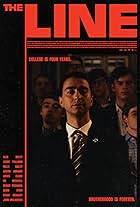
Drewbicus
Joined Jan 2014
Welcome to the new profile
We're still working on updating some profile features. To see the badges, ratings breakdowns, and polls for this profile, please go to the previous version.
Ratings5.7K
Drewbicus's rating
Reviews44
Drewbicus's rating
Feels like when I would make "movies" with my different colored army men as a kid. There's only enough plot here to establish why these people want to shoot each other and that's literally it.
The action scenes are pretty slick but lack the originality and intensity that Gareth Edwards brought to The Raid. They also are only marginally more realistic than an Arnold Schwarzenegger flick like Commando. Lots of bad guys standing in doorways so Tom Hardy can shoot them. Shotguns are more effective here than automatic weapons for some reason.
It's worth watching if you're in the mood for ultra violent action. Just know that's literally all you're going to get.
The action scenes are pretty slick but lack the originality and intensity that Gareth Edwards brought to The Raid. They also are only marginally more realistic than an Arnold Schwarzenegger flick like Commando. Lots of bad guys standing in doorways so Tom Hardy can shoot them. Shotguns are more effective here than automatic weapons for some reason.
It's worth watching if you're in the mood for ultra violent action. Just know that's literally all you're going to get.
Personally, I think that this film was simply too ambitious for its limited SyFy Channel-level production values and Flying Lotus' limited directorial abilities. A visionary director like Alex Garland might have been able to pull this film off with a significantly bigger budget.
But Lotus simply can't in a film with such cheap special effects, production design, and an unintentionally disorientating script. It's hard to buy into the world the movie's trying to create. Instead of feeling eerie or otherworldly, it just looks kind of empty and unfinished.
The script is confusing in a way that feels more sloppy than intentional. Half the time I wasn't sure if I was supposed to be confused or if the movie just didn't know how to get from one idea to the next. There's a difference between building mystery and just losing your audience, and Ash falls into the second category pretty hard.
Eiza González is clearly trying - she's talented, no doubt - but her character is so underdeveloped. She's in basically every single scene and yet by the end, I still didn't feel like I actually knew anything meaningful about her. That makes it hard to stay invested in what's happening because it feels like we're just going through the motions without any real emotional weight behind it.
In the end, I felt like Ash had a cool concept but that's about it. It's trying to be trippy, atmospheric sci-fi, but without the storytelling, characters, or visuals to carry that weight, it ended up feeling hollow. I respect the ambition, but by the time the credits rolled, I was more frustrated than intrigued.
But Lotus simply can't in a film with such cheap special effects, production design, and an unintentionally disorientating script. It's hard to buy into the world the movie's trying to create. Instead of feeling eerie or otherworldly, it just looks kind of empty and unfinished.
The script is confusing in a way that feels more sloppy than intentional. Half the time I wasn't sure if I was supposed to be confused or if the movie just didn't know how to get from one idea to the next. There's a difference between building mystery and just losing your audience, and Ash falls into the second category pretty hard.
Eiza González is clearly trying - she's talented, no doubt - but her character is so underdeveloped. She's in basically every single scene and yet by the end, I still didn't feel like I actually knew anything meaningful about her. That makes it hard to stay invested in what's happening because it feels like we're just going through the motions without any real emotional weight behind it.
In the end, I felt like Ash had a cool concept but that's about it. It's trying to be trippy, atmospheric sci-fi, but without the storytelling, characters, or visuals to carry that weight, it ended up feeling hollow. I respect the ambition, but by the time the credits rolled, I was more frustrated than intrigued.
The film mostly worked for me because of the odd pairing of the rough and decisive ex-cop played by Ed Deerman (Jeffrey Dean Morgan) and the diminutive and tormented Simon McNally (Jack Quaid) who struggles with schizophrenia. The unlikely duo prove they have unexpectedly strong chemistry as they form an unlikely alliance to find a woman that Simon believes he may have seen being kidnapped.
The actual procedural aspects of Deerman and McNally's investigation are the weakest aspect here from my perspective. They sort of just wander around encountering violent criminals for most of the film's brief runtime. But there are elements to the film that we don't typically get in these types of films, so I will give it a pass for neglecting the procedural aspects somewhat.
I adored Duncan Skiles' previous film, the vastly underrated serial killer thriller The Clovehitch Killer, and he shows all the same strengths as a director here that he did in that film. The story never lacks a sense of purpose, and the sparkling interactions between its two leads keep the story rolling steadily forward to a satisfying if unmemorable conclusion. I think a couple frightening scenes and potentially a violent encounter at the film's conclusion might have helped to make this more well-rounded as a thriller.
The exploration of Simon's mental health struggles is quite well done and integrated effectively throughout. The film even puts the audience somewhat in Simon's situation where we're not entirely sure what's real and what isn't. We feel the effects of Simon's struggles in a similar way to how he does because we too are uncertain to what extent what we are seeing is real and how much we can trust our senses.
Deerman, while not as likable as Simon, has a nice character arc as he comes to respect Simon and rethink his dismissive treatment of him as a "nutjob." A third-act sequence in which Deerman helps Simon to cope with his paralyzing demons is well-acted and powerful to behold. Deerman is the kind of rogue cop with a heart-of-gold that we can't help finding lovable even if we shouldn't. Even if his methods are problematic, his unimpeachable desire to save an innocent young woman keeps the audience in his corner.
Visually, the film feels like a 70s period thriller due to the sepia-tinged cinematography. This is in spite of the fact that the characters use iPhones and other technology. But I think Skyles was perhaps emphasizing retro aspects intentionally to create a more old-fashioned noir feel. At any rate, this doesn't feel entirely like it's set in the present day even though it ostensibly is.
All in all, Neighborhood Watch may not break new ground as a crime thriller, but its emotional resonance and strong performances make it a quietly compelling film for genre stalwarts.
The actual procedural aspects of Deerman and McNally's investigation are the weakest aspect here from my perspective. They sort of just wander around encountering violent criminals for most of the film's brief runtime. But there are elements to the film that we don't typically get in these types of films, so I will give it a pass for neglecting the procedural aspects somewhat.
I adored Duncan Skiles' previous film, the vastly underrated serial killer thriller The Clovehitch Killer, and he shows all the same strengths as a director here that he did in that film. The story never lacks a sense of purpose, and the sparkling interactions between its two leads keep the story rolling steadily forward to a satisfying if unmemorable conclusion. I think a couple frightening scenes and potentially a violent encounter at the film's conclusion might have helped to make this more well-rounded as a thriller.
The exploration of Simon's mental health struggles is quite well done and integrated effectively throughout. The film even puts the audience somewhat in Simon's situation where we're not entirely sure what's real and what isn't. We feel the effects of Simon's struggles in a similar way to how he does because we too are uncertain to what extent what we are seeing is real and how much we can trust our senses.
Deerman, while not as likable as Simon, has a nice character arc as he comes to respect Simon and rethink his dismissive treatment of him as a "nutjob." A third-act sequence in which Deerman helps Simon to cope with his paralyzing demons is well-acted and powerful to behold. Deerman is the kind of rogue cop with a heart-of-gold that we can't help finding lovable even if we shouldn't. Even if his methods are problematic, his unimpeachable desire to save an innocent young woman keeps the audience in his corner.
Visually, the film feels like a 70s period thriller due to the sepia-tinged cinematography. This is in spite of the fact that the characters use iPhones and other technology. But I think Skyles was perhaps emphasizing retro aspects intentionally to create a more old-fashioned noir feel. At any rate, this doesn't feel entirely like it's set in the present day even though it ostensibly is.
All in all, Neighborhood Watch may not break new ground as a crime thriller, but its emotional resonance and strong performances make it a quietly compelling film for genre stalwarts.

























































